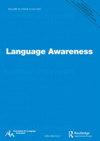提高教师和学生的语用意识在德语第二语言写作中的重要性:语法和词汇错误与语用语言错误的对比研究
IF 2.2
2区 文学
0 LANGUAGE & LINGUISTICS
引用次数: 2
摘要
摘要CEFR配套卷中的一个新量表是在线互动。新的描述涵盖了面向目标的在线交易,包括书面通信和公式化语言的使用。在荷兰商学院,学生在B1/2级学习德语是出于特殊目的:他们需要在专业背景下熟练掌握德语,以促进互动和交易。问题是,母语用户如何接受他们邀请德国同事参加会议的尝试,这种尝试并不总是完美无瑕的。B1/2德语水平是否足以避免麻烦的情况?这些学习者的B1/2水平是否足以与德国伴侣保持良好关系?这项研究调查了交际冲突是否会因为德语使用的缺陷而发生。98名德国商业专业人士,均为母语为德语的母语人士,被要求使用7分的Likert量表对荷兰德语学习者撰写的16封商业电子邮件中的语用语言不正确以及句法、词汇和形态错误进行评分。结果表明,语用语言不恰当比句法、词汇或形态错误更令人烦恼,这表明二语德语写作课程应该在跨文化交际中提高对语用语言力量的更明确的认识。这一想法与新的配套卷中的建议一致。此外,还研究了作者的外国血统和荷兰国籍是否会影响德国专业人士的判断。事实并非如此。本文章由计算机程序翻译,如有差异,请以英文原文为准。
The importance of raising teachers’ and students’ awareness of pragmatics in German second language writing: a study of the effect of grammatical and lexical errors compared to pragma-linguistic infelicities
Abstract One of the new scales in the CEFR Companion Volume is online interaction. The new descriptors cover goal-oriented online transactions, including written correspondence and the use of formulaic language. In Dutch business schools, students learn German for special purposes at B1/2 level: they are expected to master German in a professional context well enough to facilitate interactions and transactions. The question is how their not always flawless attempts at inviting a German colleague to a meeting are received by L1 language users. Is the level of B1/2 German sufficient to avoid bothersome situations? Is these learners’ mastery at B1/2 level sufficient to maintain a good relationship with a German partner? This study investigated whether communicative clashes might occur because of flawed German language use. Ninety-eight German business professionals, all L1 speakers of German, were asked to rate pragma-linguistic infelicities and syntactic, lexical and morphological errors in 16 business e-mails written by Dutch learners of German, using a 7-point Likert scale. The results showed that pragma-linguistic infelicities were considered more bothersome than syntactic, lexical or morphological errors, which suggests that L2 German writing courses should raise more explicit awareness of pragma-linguistic forces in intercultural communication. This idea is in line with recommendations contained in the new Companion Volume. Furthermore, it was studied whether knowledge of the writer’s foreign provenance and Dutch nationality affected the judgement of the German professionals. This was not the case.
求助全文
通过发布文献求助,成功后即可免费获取论文全文。
去求助
来源期刊

Language Awareness
Multiple-
CiteScore
3.70
自引率
10.00%
发文量
18
期刊介绍:
Language Awareness encourages and disseminates work which explores the following: the role of explicit knowledge about language in the process of language learning; the role that such explicit knowledge about language plays in language teaching and how such knowledge can best be mediated by teachers; the role of explicit knowledge about language in language use: e.g. sensitivity to bias in language, manipulative aspects of language, literary use of language. It is also a goal of Language Awareness to encourage the establishment of bridges between the language sciences and other disciplines within or outside educational contexts.
 求助内容:
求助内容: 应助结果提醒方式:
应助结果提醒方式:


